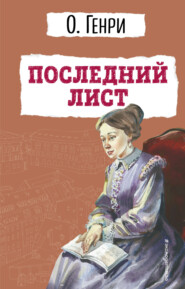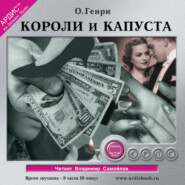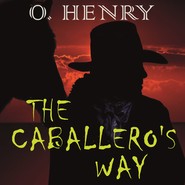По всем вопросам обращайтесь на: info@litportal.ru
(©) 2003-2024.
✖
Strictly Business: More Stories of the Four Million
Настройки чтения
Размер шрифта
Высота строк
Поля
After Hart and Cherry had gotten "Mice Will Play" flawless, they had a try-out at a vaudeville house that accommodates. The sketch was a house wrecker. It was one of those rare strokes of talent that inundates a theatre from the roof down. The gallery wept; and the orchestra seats, being dressed for it, swam in tears.
After the show the booking agents signed blank checks and pressed fountain pens upon Hart and Cherry. Five hundred dollars a week was what it panned out.
That night at 11:30 Bob Hart took off his hat and bade Cherry good night at her boarding-house door.
"Mr. Hart," said she thoughtfully, "come inside just a few minutes. We've got our chance now to make good and make money. What we want to do is to cut expenses every cent we can, and save all we can."
"Right," said Bob. "It's business with me. You've got your scheme for banking yours; and I dream every night of that bungalow with the Jap cook and nobody around to raise trouble. Anything to enlarge the net receipts will engage my attention."
"Come inside just a few minutes," repeated Cherry, deeply thoughtful. "I've got a proposition to make to you that will reduce our expenses a lot and help you work out your own future and help me work out mine – and all on business principles."
"Mice Will Play" had a tremendously successful run in New York for ten weeks – rather neat for a vaudeville sketch – and then it started on the circuits. Without following it, it may be said that it was a solid drawing card for two years without a sign of abated popularity.
Sam Packard, manager of one of Keetor's New York houses, said of Hart & Cherry:
"As square and high-toned a little team as ever came over the circuit. It's a pleasure to read their names on the booking list. Quiet, hard workers, no Johnny and Mabel nonsense, on the job to the minute, straight home after their act, and each of 'em as gentlemanlike as a lady. I don't expect to handle any attractions that give me less trouble or more respect for the profession."
And now, after so much cracking of a nutshell, here is the kernel of the story:
At the end of its second season "Mice Will Play" came back to New York for another run at the roof gardens and summer theatres. There was never any trouble in booking it at the top-notch price. Bob Hart had his bungalow nearly paid for, and Cherry had so many savings-deposit bank books that she had begun to buy sectional bookcases on the instalment plan to hold them.
I tell you these things to assure you, even if you can't believe it, that many, very many of the stage people are workers with abiding ambitions – just the same as the man who wants to be president, or the grocery clerk who wants a home in Flatbush, or a lady who is anxious to flop out of the Count-pan into the Prince-fire. And I hope I may be allowed to say, without chipping into the contribution basket, that they often move in a mysterious way their wonders to perform.
But, listen.
At the first performance of "Mice Will Play" in New York at the Westphalia (no hams alluded to) Theatre, Winona Cherry was nervous. When she fired at the photograph of the Eastern beauty on the mantel, the bullet, instead of penetrating the photo and then striking the disk, went into the lower left side of Bob Hart's neck. Not expecting to get it there, Hart collapsed neatly, while Cherry fainted in a most artistic manner.
The audience, surmising that they viewed a comedy instead of a tragedy in which the principals were married or reconciled, applauded with great enjoyment. The Cool Head, who always graces such occasions, rang the curtain down, and two platoons of scene shifters respectively and more or less respectfully removed Hart & Cherry from the stage. The next turn went on, and all went as merry as an alimony bell.
The stage hands found a young doctor at the stage entrance who was waiting for a patient with a decoction of Am. B'ty roses. The doctor examined Hart carefully and laughed heartily.
"No headlines for you, Old Sport," was his diagnosis. "If it had been two inches to the left it would have undermined the carotid artery as far as the Red Front Drug Store in Flatbush and Back Again. As it is, you just get the property man to bind it up with a flounce torn from any one of the girls' Valenciennes and go home and get it dressed by the parlor-floor practitioner on your block, and you'll be all right. Excuse me; I've got a serious case outside to look after."
After that, Bob Hart looked up and felt better. And then to where he lay came Vincente, the Tramp Juggler, great in his line. Vincente, a solemn man from Brattleboro, Vt., named Sam Griggs at home, sent toys and maple sugar home to two small daughters from every town he played. Vincente had moved on the same circuits with Hart & Cherry, and was their peripatetic friend.
"Bob," said Vincente in his serious way, "I'm glad it's no worse. The little lady is wild about you."
"Who?" asked Hart.
"Cherry," said the juggler. "We didn't know how bad you were hurt; and we kept her away. It's taking the manager and three girls to hold her."
"It was an accident, of course," said Hart. "Cherry's all right. She wasn't feeling in good trim or she couldn't have done it. There's no hard feelings. She's strictly business. The doctor says I'll be on the job again in three days. Don't let her worry."
"Man," said Sam Griggs severely, puckering his old, smooth, lined face, "are you a chess automaton or a human pincushion? Cherry's crying her heart out for you – calling 'Bob, Bob,' every second, with them holding her hands and keeping her from coming to you."
"What's the matter with her?" asked Hart, with wide-open eyes. "The sketch'll go on again in three days. I'm not hurt bad, the doctor says. She won't lose out half a week's salary. I know it was an accident. What's the matter with her?"
"You seem to be blind, or a sort of a fool," said Vincente. "The girl loves you and is almost mad about your hurt. What's the matter with you? Is she nothing to you? I wish you could hear her call you."
"Loves me?" asked Bob Hart, rising from the stack of scenery on which he lay. "Cherry loves me? Why, it's impossible."
"I wish you could see her and hear her," said Griggs.
"But, man," said Bob Hart, sitting up, "it's impossible. It's impossible, I tell you. I never dreamed of such a thing."
"No human being," said the Tramp Juggler, "could mistake it. She's wild for love of you. How have you been so blind?"
"But, my God," said Bob Hart, rising to his feet, "it's too late. It's too late, I tell you, Sam; it's too late. It can't be. You must be wrong. It's impossible. There's some mistake.
"She's crying for you," said the Tramp Juggler. "For love of you she's fighting three, and calling your name so loud they don't dare to raise the curtain. Wake up, man."
"For love of me?" said Bob Hart with staring eyes. "Don't I tell you it's too late? It's too late, man. Why, Cherry and I have been married two years!"
II
THE GOLD THAT GLITTERED
A story with a moral appended is like the bill of a mosquito. It bores you, and then injects a stinging drop to irritate your conscience. Therefore let us have the moral first and be done with it. All is not gold that glitters, but it is a wise child that keeps the stopper in his bottle of testing acid.
Where Broadway skirts the corner of the square presided over by George the Veracious is the Little Rialto. Here stand the actors of that quarter, and this is their shibboleth: "'Nit,' says I to Frohman, 'you can't touch me for a kopeck less than two-fifty per,' and out I walks."
Westward and southward from the Thespian glare are one or two streets where a Spanish-American colony has huddled for a little tropical warmth in the nipping North. The centre of life in this precinct is "El Refugio," a café and restaurant that caters to the volatile exiles from the South. Up from Chili, Bolivia, Colombia, the rolling republics of Central America and the ireful islands of the Western Indies flit the cloaked and sombreroed señores, who are scattered like burning lava by the political eruptions of their several countries. Hither they come to lay counterplots, to bide their time, to solicit funds, to enlist filibusterers, to smuggle out arms and ammunitions, to play the game at long taw. In El Refugio, they find the atmosphere in which they thrive.
In the restaurant of El Refugio are served compounds delightful to the palate of the man from Capricorn or Cancer. Altruism must halt the story thus long. On, diner, weary of the culinary subterfuges of the Gallic chef, hie thee to El Refugio! There only will you find a fish – bluefish, shad or pompano from the Gulf – baked after the Spanish method. Tomatoes give it color, individuality and soul; chili colorado bestows upon it zest, originality and fervor; unknown herbs furnish piquancy and mystery, and – but its crowning glory deserves a new sentence. Around it, above it, beneath it, in its vicinity – but never in it – hovers an ethereal aura, an effluvium so rarefied and delicate that only the Society for Psychical Research could note its origin. Do not say that garlic is in the fish at El Refugio. It is not otherwise than as if the spirit of Garlic, flitting past, has wafted one kiss that lingers in the parsley-crowned dish as haunting as those kisses in life, "by hopeless fancy feigned on lips that are for others." And then, when Conchito, the waiter, brings you a plate of brown frijoles and a carafe of wine that has never stood still between Oporto and El Refugio – ah, Dios!
One day a Hamburg-American liner deposited upon Pier No. 55 Gen. Perrico Ximenes Villablanca Falcon, a passenger from Cartagena. The General was between a claybank and a bay in complexion, had a 42-inch waist and stood 5 feet 4 with his Du Barry heels. He had the mustache of a shooting-gallery proprietor, he wore the full dress of a Texas congressman and had the important aspect of an uninstructed delegate.
Gen. Falcon had enough English under his hat to enable him to inquire his way to the street in which El Refugio stood. When he reached that neighborhood he saw a sign before a respectable red-brick house that read, "Hotel Español." In the window was a card in Spanish, "Aqui se habla Español." The General entered, sure of a congenial port.
In the cozy office was Mrs. O'Brien, the proprietress. She had blond – oh, unimpeachably blond hair. For the rest she was amiability, and ran largely to inches around. Gen. Falcon brushed the floor with his broad-brimmed hat, and emitted a quantity of Spanish, the syllables sounding like firecrackers gently popping their way down the string of a bunch.
"Spanish or Dago?" asked Mrs. O'Brien, pleasantly.
"I am a Colombian, madam," said the General, proudly. "I speak the Spanish. The advisement in your window say the Spanish he is spoken here. How is that?"
"Well, you've been speaking it, ain't you?" said the madam. "I'm sure I can't."
At the Hotel Español General Falcon engaged rooms and established himself. At dusk he sauntered out upon the streets to view the wonders of this roaring city of the North. As he walked he thought of the wonderful golden hair of Mme. O'Brien. "It is here," said the General to himself, no doubt in his own language, "that one shall find the most beautiful señoras in the world. I have not in my Colombia viewed among our beauties one so fair. But no! It is not for the General Falcon to think of beauty. It is my country that claims my devotion."
At the corner of Broadway and the Little Rialto the General became involved. The street cars bewildered him, and the fender of one upset him against a pushcart laden with oranges. A cab driver missed him an inch with a hub, and poured barbarous execrations upon his head. He scrambled to the sidewalk and skipped again in terror when the whistle of a peanut-roaster puffed a hot scream in his ear. "Válgame Dios! What devil's city is this?"
As the General fluttered out of the streamers of passers like a wounded snipe he was marked simultaneously as game by two hunters. One was "Bully" McGuire, whose system of sport required the use of a strong arm and the misuse of an eight-inch piece of lead pipe. The other Nimrod of the asphalt was "Spider" Kelley, a sportsman with more refined methods.
In pouncing upon their self-evident prey, Mr. Kelley was a shade the quicker. His elbow fended accurately the onslaught of Mr. McGuire.
"G'wan!" he commanded harshly. "I saw it first." McGuire slunk away, awed by superior intelligence.
"Pardon me," said Mr. Kelley, to the General, "but you got balled up in the shuffle, didn't you? Let me assist you." He picked up the General's hat and brushed the dust from it.

















